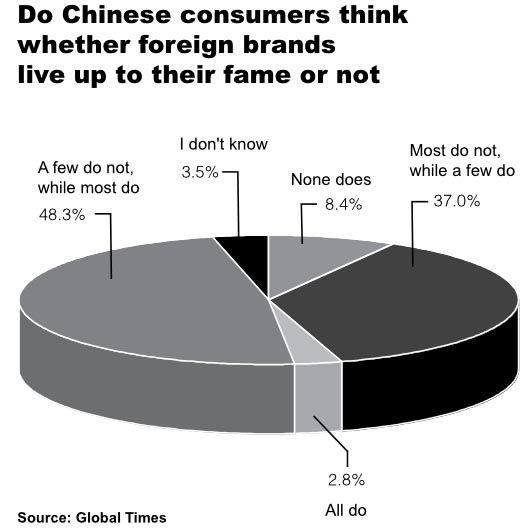Foreign Brands Trapped in Trust Crisis
Being noble and respected once, the foreign brands are losing their graces in China. As more and more Chinese people get to know the foreign brands better, they have begun to recognize, and get offended by, the quality and service problems. Chinese newspaper Global Times recently made a research about “Chinese consumers affection towards foreign brands”. Questionnaires were sent to over 2,000 respondents in universities, state-owned enterprises, foreign-invested companies and freelancers. The collected valid results show that most respondents do not think so highly of foreign brands as before, and the superiority of foreign brands no longer works for Chinese consumers.
Changes of brand image in 30 years
A European watch brand titled “the brand for European royal nobles” actually does not live up to its name, which greatly angered some Chinese consumers.
Mr. Liu was one of them. He bought this watch with RMB 200 thousand for his wedding anniversary. As the slogan describes, Mr. Liu could feel the “classic, heritage and fashion” every time he raised his arm to see the watch on his wrist.
However, his good feeling shattered when he accidentally knew from a friend that this watch was only sold at RMB 55 thousand in a trade fair in Europe. “I was cheated,” he said.
This is not a single case and does not mean too much in todays China. But if that thing happened 30 years ago, this will be shocking news.
In the 1970s-1980s, foreign brands are mysterious and revered for Chinese people. The past 30 years saw the improving livelihood of Chinese people, the increasing economic trade and cultural communications between China and foreign countries. During that process more and more foreign brands get into China. They rely on their strength in capital to stage the war of ads for a greater market share in China. Apart from the efforts in the TV, magazines, newspapers – and Internet later, foreign companies also established a lot of exclusive stores and flagship stores in China as of the 1990s.
Because of this, the Chinese companies are more and more in touch with foreign brands and buying foreign companies is no longer the “exclusive right” of rich men.
However, the better understanding of foreign brands leads to the more exposed problems of foreign products in product and service quality. In recent years, there are numerous reports about foreign brands unequal treatment for Chinese consumers and the quality problems that caused economic or even physical loss. Hurt by the losses, Chinese consumers began to doubt foreign brands traditional images as the best service and product suppliers.
Various clues show that foreign brands are on a decline in China. This has been supported by many investigations and researches.
The Better Profile
The research made by Global Times provided the latest proofs. According to the research result, over 40% of respondents had a worse feeling about foreign brands. Concretely, 41.8% of respondents thought that the images of foreign brands got worse in recent years. Only 7.7% thought that they got better. 41.7% felt no changes while the rest could not give a clear answer.
Global Times made similar research in the past two years ago. The result brought some comfort to foreign brands, as an increasing proportion of respondents believed that foreign brands turned out to be better (from 4.3% in 2011 to 7.7% in 2013). That means foreign brands might have heard of the complaints of Chinese consumers and made some positive changes,
More comforts for foreign brands were brought about by the research. The 2013 research showed that 28.7% of respondents spent more money in buying foreign brands, while 30.8% claimed the less spending on foreign brands. The rest felt no changes or simply replied “I dont know”.
Compared with the results in 2011 and 2012, the proportion of respondents spending more on foreign brands also increased (18.6% in 2011 and 27.7% in 2012), another reward for foreign brands efforts in bettering their images.
Foreign brands efforts could be clearly seen in recent years. For example, Apple, a well-established brand in China, was criticized over the unfair sales and after-sale services for Chinese consumers for long. In April 2013, after being reported with several after-sale incidents in China, Apples CEO Tim Cook made a public apology to Chinese consumer and promised to improve the after-sale service in China to the level of other countries.
Consumers later found that Apple adopted a consolidated service standard for Chinese consumers. Tim Cooks apology, and Apples visible changes, obviously erased Chinese consumers rage and helped to revive this giants image in China.
The Wronged Fame
Foreign brands efforts have made some positive results, but that is not enough, for another research result might bring foreign brands down to their knees again.
The research found that 86.8% of respondents believed that foreign brands, or at least a part of them, did not live up to their fame. Concretely, 46.6% of respondents said that most foreign brands provide services and quality that match their fame while a small part can not. But there are 31.7% respondents thinking the reverse way. And 8.5% of respondents even said that none of foreign brands lived up to their name.
The result was even worse than 2012. As more people chose the answer that “all or most of foreign brands dont live up to their name”. the proportion was 40.2%, up 3.6 per cent compared with a year ago,
This result is enhanced by some quality surveys made by the Chinese government. On July 2, the State Administration of Quality Supervision made a report, saying that several groups of imported goods for Chinese were found with quality problems, involving the well-known brands like Gucci and Armani.

